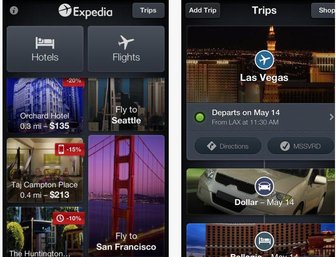Breaking barriers and driving downloads is the way to 'app-iness'
Expedia has had some success in driving downloads of its app which requires a different set of rules to mobile web and digital marketing. EyeforTravel’s Ritesh Gupta finds how.
Mobile web marketing is similar to digital marketing but one needs to approach mobile app marketing in a completely different way. Indeed, app store optimisation and astute advertising campaigns have to be spot on in order to create awareness and drive downloads. Like digital marketing, mobile marketing has a strong focus on direct response, but the focus for mobile app marketing is largely on driving one action, which will build lasting links with customers: driving downloads. As EyeforTravel’s most recent report, Social Media & Mobile in Travel Distribution, 2013 report highlights, apps deliver better booking and search functionality to consumers but they must be highly relevant to break the barriers to download.
Expedia seems to be having some success in this arena. In the first quarter of 2013, the online travel agent passed the 30-million download mark for its apps. The company’s senior manager, Global Mobile Marketing, Simon Dupuy says apps are a new ecosystem with different rules and ways to measure success. As in the early days of digital, mobile marketing rules are changing very rapidly to keep up with the technology and marketers need to be flexible with their strategy to keep on top.

“Driving downloads requires more proactive engagement from customers than driving click-throughs and we can’t generate sideways traffic into a website in the same way in the digital marketing world,” explains Dupuy, “but once a user has downloaded an app it usually becomes the point of reference for any purchase.”
According to Dupuy, metrics like cohort analysis are consequently very insightful particularly considering the lifetime value of an app user. Where you may visit a website on an ad hoc basis or visit several, many of the apps people download are apps that they will find useful on a regular or daily basis. As a hotel or flight is not a regular purchase for the vast majority it’s particularly important to target people when they are thinking about travel.
“Users tend to have a low number apps so it’s essential for us to ensure the Expedia app is the ‘travel app’ of choice. With the widest selections of travel products available OTAs offer all-in-one advantages for customers and will become the app-of-choice for consumers, who will ultimately likely only have one or two select travel apps on their devices and as a full-service OTA, Expedia obviously has further advantages here,” says Dupuy.
Staying focused
As with digital, a siloed view will not enable a company to reach its full marketing potential. It’s important to focus on cross-team collaboration from product to digital, social and traditional marketing. “Increasingly we see people moving between devices so an integrated approach to the product is essential and the same approach should also apply to communication initiatives,” says Dupuy.
Social media marketing can be a true enabler to an app’s success but the key, as always, is in what users say and word of mouth is really what drives success.
Dupuy says what’s particularly interesting is how early on in the purchase path travellers are turning to mobile. Expedia Beach Report research shows that globally that one in four consumers look to social media and more than 40% look to traveller reviews as one of the top resources when deciding on a destination for a beach holiday. According to Expedia’s mobile study 48% of mobile owning travellers are turning to their mobile for inspiration.
With the rise of multiple-device ownership, now more than ever, there is a need for an integrated approach with a strong presence and a cohesive brand voice across multiple devices right from the start of the planning process.
Even start-ups are trying to capitalise on such initiatives. HotelQuickly, a mobile-only, last minute hotel booking application currently active in the Asia Pacific region, managed to expand its reach using Facebook. One of its campaigns this year - mainly a monthly lucky-draw with the winner bagging a holiday in Bali - required consumers to access its Facebook page to see the details, share the contest with at least give friends, download the app, and enter a specific voucher code. “This allowed us to very easily track the results, and the campaign went pretty viral with more than 200 000 people reached,” shared Christian Mischler, co-founder and COO, HotelQuickly.
Improving customer experience – an ongoing process
As reviews and ratings play a key role in marketing an app, the experience itself is critical to marketing success.
It’s therefore essential to work closely with the product team to ensure your app evolves with the customer needs and that you have a continual feedback review process in place, says Dupuy. He says scale is also a significant factor: the more data you obtain the better you can ensure you offer an enhanced user experience.
By monitoring and analysing usage, the team at Expedia has been able to enhance the app experience.
“For example, as we noted that up to around 70% of hotel bookings through the Expedia app are done for the same night, in the same city a customer is located in, we have worked with our partners to introduce special deals for this type of last-minute booking, offering a new option for hotels to looking to promote last minute inventory,” says Dupuy. Having focused on optimising the experience through continual analysis, the brands with Expedia, Inc. are now seeing their apps being downloaded at a rate of 70 times a minute.

